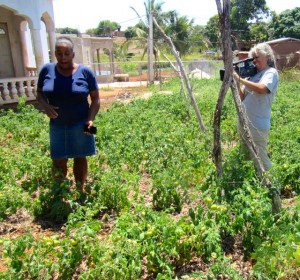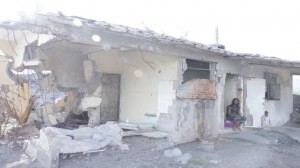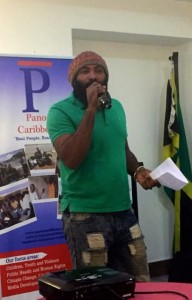
Finding Their Voices for Climate Change
April 15th, 2019
It’s quite challenging. When we are talking about climate change, we need to “break it down.” We must find ways (not one way, several ways) to explain it. We need to demonstrate what is happening here and now, and what may happen in the near future. And we need to point to solutions. Gloom and doom just paralyze the response of people on the ground. The question “Wha’ fi duh?” has to be answered.
I have had the honour of participating (as an observer/reporter) in three out of the four recent workshops organized by Panos Caribbean under the ongoing Voices for Climate Change project, which is supported by the good people at the Planning Institute of Jamaica as well as the Government’s Climate Change Division.
The concept is simple, but the process has been fairly complex. The goal was to encourage and train a group of artists and community members from three communities to express and explain – in music, song, narratives, activism, even a little poetry – the critical impact of climate change on Jamaica to wider audiences. This involved throwing lots of incredibly valuable information at the selected group; to take them on eye-opening field trips, and finally, to sit down and hone compelling messages that will excite audiences of different ages and backgrounds.
The participants are farmers and fishers, community activists, singers and deejays from the Kingston/St. Andrew corporate area, Clarendon, St. Elizabeth and St. Ann. They have been focused, engaged, ready to learn and always eager to ask questions. The artists have been constantly composing lyrics in their head (you can literally see, and hear, the thought process) and the mutual support and collaboration has been remarkable.
It’s one thing to talk and to show slides to illustrate your points. But perhaps the best illustration of all is “hands on” and experiential – like the (somewhat hazardous) boat trip we took recently, to view the coral gardens planted by the White River Marine Association. There are many examples of the impact of climate change before our very eyes if we look. We know our climate is changing. There have been many comments on the disappearance of Hellshire Beach, which when I first beheld it in the 1980s was a wide stretch of dazzling white sand, with fishing boats pulled up on the shore. There are other highly visible signs: the wrecked coastline around Bull Bay, and the devastated homes of Caribbean Terrace after the “double whammy” of Ivan (2004) and Dean (2007). Forest fires in the hills, floods in the cities, reservoirs falling to critically low levels.

A farmer in St. Elizabeth explains her challenge with drought and water shortages, filmed by Esther Figueroa. (My photo)
We should observe, and take note. The workshop participants have been doing so, and have had much to report. Two of their main concerns were the wanton cutting down of trees for agriculture, coal burning or to build a house (and the failure to replant trees of any description); and the plague of garbage that swamps communities, creating health concerns. The farmers of one St. Elizabeth community, situated above the fumes and belching smoke of the JISCO aluminum plant in Nain and its toxic red “lake,” expressed bitterness over the impact of the emissions on their crops and on the soil itself. We saw it for ourselves.
None of these issues are directly related to climate change, perhaps; but they point to a general disregard for the environment – and ways in which the effects of our changing climate are exacerbated or ignored in the everyday activities within rural communities. This, of course, is where our Voices come in. In St. Elizabeth, besides the concert, a community fair is planned – two ways of communicating with friends, family, neighbours and beyond. Performance is great; one-on-one conversations also work well.
There are ways of communicating the message: Climate change is real. And, as one presenter from the Discovery Bay Marine Lab told the group…Everything is connected.
Tags: agriculture, bauxite, Caribbean Terrace, Clarendon, Climate Change, Climate Change Division, deforestation, Discovery Bay Marine Lab, drought, fishermen, JISCO, Kingston, NGO, Panos Caribbean, Planning Institute of Jamaica, solid waste, St. Ann, St. Elizabeth, training, Voices for Climate Change, White River Fish Sanctuary
The Gleaner reserves the right not to publish comments that may be deemed libelous, derogatory or indecent.
To respond to The Gleaner please use the feedback form.
One Response to “Finding Their Voices for Climate Change”
- We Are the Zoomers
- Living Online with Humans and Birds: NAOC 2020
- Human Trafficking and the Problem of Public Education
- Down Memory Lane
- Are We Ready to Recover from COVID-19?
- Road Safety Matters: Is Your Vehicle Safe?
- Sexual Harassment, Me Too, and the Minister’s Disturbing Giggle
- The Vulnerable Senior Citizens, Private Care Homes and COVID-19
- A Muddle Over Masks
- Here is Something Life-Saving You Can Do: Give Blood!





[…] Music: Jamaica’s Voices for Climate Change – singers, deejays, poets – have been working on some powerful lyrics this year, workshopping and going on field trips. They are taking them on the […]